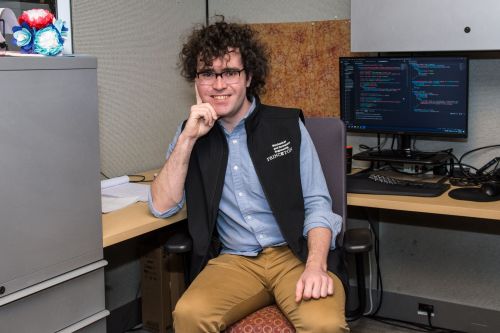
For Princeton Ph.D. candidate James Roggeveen, there was not one path, but many experiences – in geography and academia – that has led him to where he is today.
One such experience was attending Cambridge, the UK version, where Roggeveen received his Master of Advanced Study in 2019. Perhaps it was a 2016 internship at NASA where he “became obsessed with space.”
Or maybe, and perhaps most incongruously, it was as captain of the MIT Asian Dance Team during his periodic visits from 2014-18 in South Korea.
“It was a little disparate,” he admits about his balletic experiences during a recent chat. “Almost everyone on my floor auditioned. It was a very inclusive dance team. It becomes your social circle.”
Roggeveen is accustomed to trying different things and different places in the time since he received his B.S. in Mechanical Engineering at a different Cambridge – from MIT, the one outside Boston – in 2018. There he explored the dynamics of fluid films undergoing Faraday instability resting on a still bath.
About research for his thesis, Roggeveen explains “how can you explain surface phenomena? We looked at the interactions of different fluids under vibrating conditions.”
“I thought I was going to major in physics, but wasn’t interested enough in some of the topics,” he explains about an early pivot. He became interested in mechanics, but more classical than, say, quantum.
From there, he was off to Cambridge on the other side of the pond.
“It was better than anything I could have dreamed of,” he says of the work and experience that led to his Masters. “I was a little unprepared. Turns out I was very unprepared.” Unprepared didn’t stop him from Passing with Distinction with a Thesis on Gravity Currents passing over Cavities, where he studied the removal of dense fluid from cavities by a gravity current passing overhead. He admits that the original challenge was that “I was coming from an engineering background and entering a math program.”
But the grandeur of the setting was not lost on him. “It’s immersed in history. You go into your dining hall and it was built by Henry the Eighth,” he says with a chuckle.
At first, he had no idea that Princeton was his next destination.
“I was pretty sure I wasn’t coming here,” he admits. “I was a staunch New Englander” says the Nantucket, Massachusetts native. “I relied on my friends from undergrad,” he says about one factor in making his choice. He discussed theoretical fluid work with his advisor and it turned out Princeton “was by far the best fit for me.” He even admits that for a time, “there was no way I was going to grad schools.” Very instrumental was his internship experiences in opening that door.
At Princeton, Roggeveen, a Mechanical Engineering candidate who expects to complete his work around 2024, uses “math to explain things in fluid phenomena observed in nature.” Given the inherent limits of models, he explores how systems behave.
“We try to explain interesting fluid mechanical phenomena, or investigate fluid mechanical phenomena using mathematics,” he adds. “I use math to explain something observed in nature or take an existing model to use math to explain properties, and how can we expect these systems to behave.”
He received a Sayre Award for Academic Excellence for first year achievements and, his second year included a Guggenheim Fellowship for excellence in coursework and research.
Growing up, Roggeveen was a “three season sailor” in Nantucket. In the sixth grade he started attending science fairs and found himself gravitating towards experiments that involved fluids. There was not much of a science focus in high school, he explains, but he connected with a scientist who advised him. He looked into things like ice freezing and built his own wind tunnel.
He did an internship with the Jet Propulsion Lab at NASA in 2016. But he connected with the engineers, not the astronauts. Referring to his favorite movie from childhood, Apollo 13, he remembers wanting to “be one of the cool guys solving the problems.”
“This was the fulfillment of a childhood dream” he recalls about the experience. He then also spent part of 2017 as a Vehicle Engineering Intern at Elon Musk’s Space X, where as a member of the Falcon 9 Vehicle Integration and Test team he worked on development and deployment of manufacturing and process improvements.
“It was a very cool experience,” he says. “It was when I realized I liked more fundamental research versus working in the corporate world.” On his second day he was taken by his boss inside one of the booster’s fuel tanks and six weeks later “I got to see that same booster take off from mission control.”
His desire to stay in his research lane was accentuated during a 2018 internship at Samsung Electronics. “This sped up my desire to not be in corporate,” he remembers.
It was at this point that, through MIT, he became an instructor in the Global Teaching Labs in South Korea. He designed and taught workshops on robotics and STEM to low-income middle and high school students in Seoul.
“I had a blast,” he shares. “I liked learning languages.” Roggeveen is proficient in Chinese, Korean and French. “It was tough in some ways,” he admits. “I was forced to use language skills. I had a fear (at first) talking to anyone that wasn’t my teacher. But you can have a productive communication even if you’re not nailing the words.”
At Princeton, he continues to pay it forward. “I’m a residential graduate student,” he explains. “We host events for the undergrads. We’re around if they need advice in life, or just someone to talk to.”
-- David Krakow